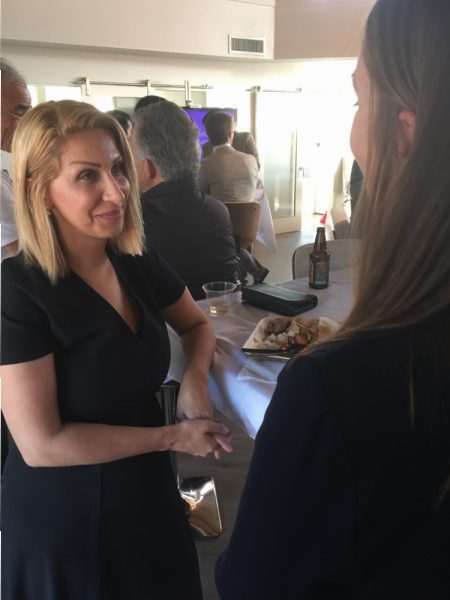By Cassandra Reinhart, Special to the Independent

In the glow of Laguna Beach’s setting sun, you can see that Farah Alkhafaji’s eyes have seen too much for her 35 years.
“My father was kidnapped, my husband was murdered, and I saw all of it,” Alkhafji said. “My family has been threatened; I have been threatened everyday. I couldn’t stay in Baghdad.”
The Iraqi-born Alkhafaji started supporting the U.S. military in Iraq in 2003 at the age of 19, providing the troops with logistics, engineering supplies, and translating for them. As a result of her support and commitment to the U.S. troops, her family was persecuted.
“I was being threatened to a death sentence because of my support,” Alkhafaji said. “That’s when a friend of mine advised me to reach out to IRAP.”
Alkhafaji, and Becca Heller, the director of the International Refugee Assistance Project, or IRAP, told their stories Tuesday at an event in Laguna Beach observing World Refugee Day. IRAP is on the frontlines of the controversial refugee ban playing out in front of the U.S. Supreme court, as the lead plaintiff in the case that challenged President Trump’s executive order banning travelers from several countries.
“Traditionally there is a lot of deference to executive power and authority, but traditionally the executive doesn’t regularity tweet super racist stuff,” Heller said. “The Supreme Court is being presented with a situation that has no real precedent in history.”
New York-based IRAP is made up of a 31-person team that provides free legal representation to the worlds most vulnerable refugees fleeing prosecution including Afghan and Iraqi individuals, like Alkhafaji, who assisted U.S. troops in those countries. To date, IRAP has resettled over 3,600 refugees from 18 different countries, and have provided some kind of legal assistance to 20,000 individuals. The project has helped pass eight pieces of federal legislation in the past few years to provide Visas or human rights to over 160,000 individuals.
“What this administration has done by trying to decrease the amount of refugees we are admitting by over half and discriminating against refugees and other immigrants from majority Muslim states is abominable,” Heller said. “It’s important for people to push back and say, we are a nation of immigrants, we are a nation founded on principals welcoming those who are persecuted, we want to step up and do our share of the humanitarian work in the world.”
The presentation was put on by the Interfaith Refugee Project, which has partnered with four organizations—HIAS, Islamic Relief, World Vision and the International Refugee Assistance Project, to connect people to organizations helping refugees regardless of religion, race or other identity-based categorizations.
“Through a single donation people are giving to a Jewish, Christian, Muslim organization and a secular organization,” said Laguna resident Julie Gersten, who with her husband Greg Sharenow, helped start and run the project. “The idea is to build awareness for faith and ask people to step out of their silos.”
Alkhafaji told guests her story of how IRAP provided her and her two children a safe home in Baghdad until they could fly out to Jordan and get to the United States. Now living in Virginia, Alkhafaji remarried a U.S. Navy officer, and manages a clothing store. She says her dream is to work for the United Nations as a human rights advocate to help others in situations similar to hers.
“I did not choose everything that has happened to me in my life,” Alkhafaji said. “The terrorists, what other people do, it is not similar to us. We are surviving, we are fighters.”
The Trump administration filed a brief this week asking the Supreme Court to reinstate the travel ban on nationals from six Muslim countries from entering the U.S. in a last ditch effort before the high court decides whether to take up the case.
Through speaking at events like the one in Laguna Beach, Alkhafaji and Heller want to show people the real faces of refugees in the United States.
“I think people who are backing the ban are afraid of their own life situation, and looking for a scapegoat and the administration has provided one in the form of refugees and immigrants,” Heller said. “We are going to fight tooth and nail to get the executive order struck down.”




